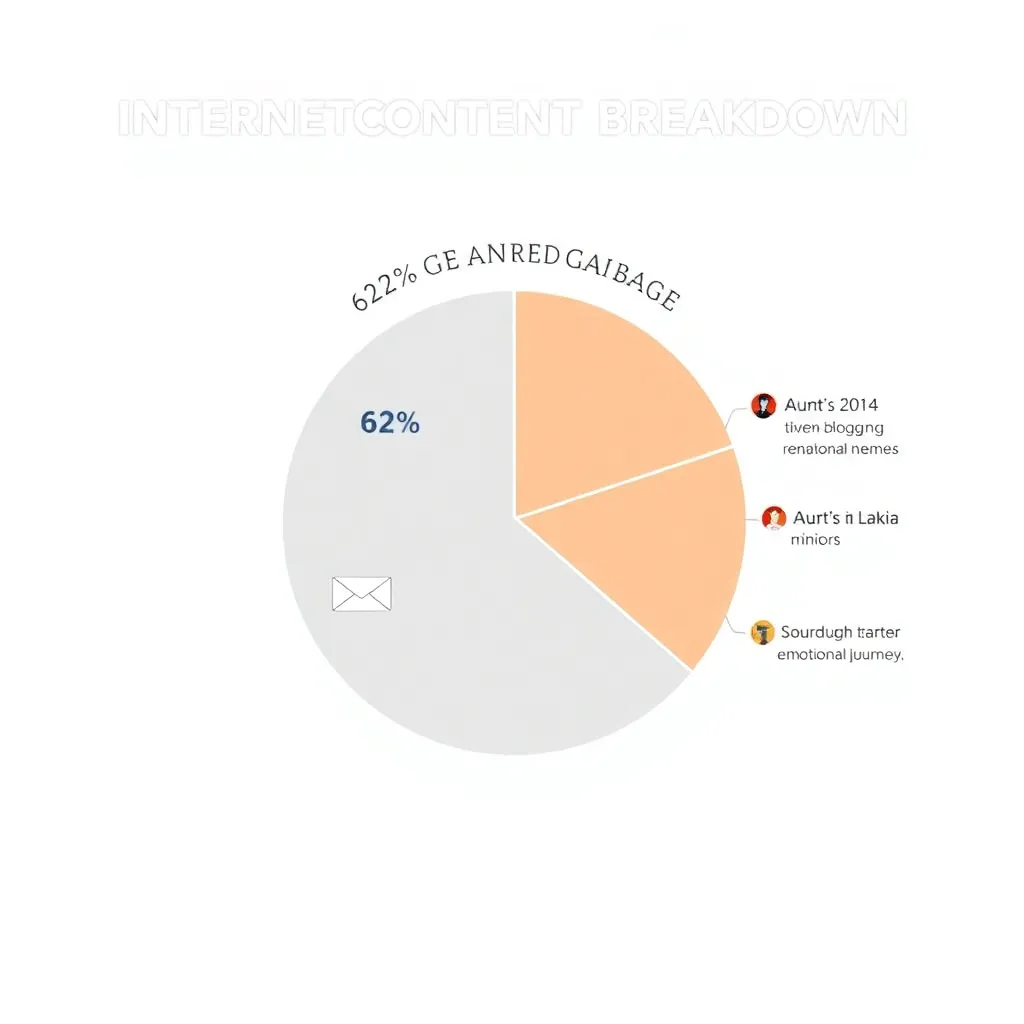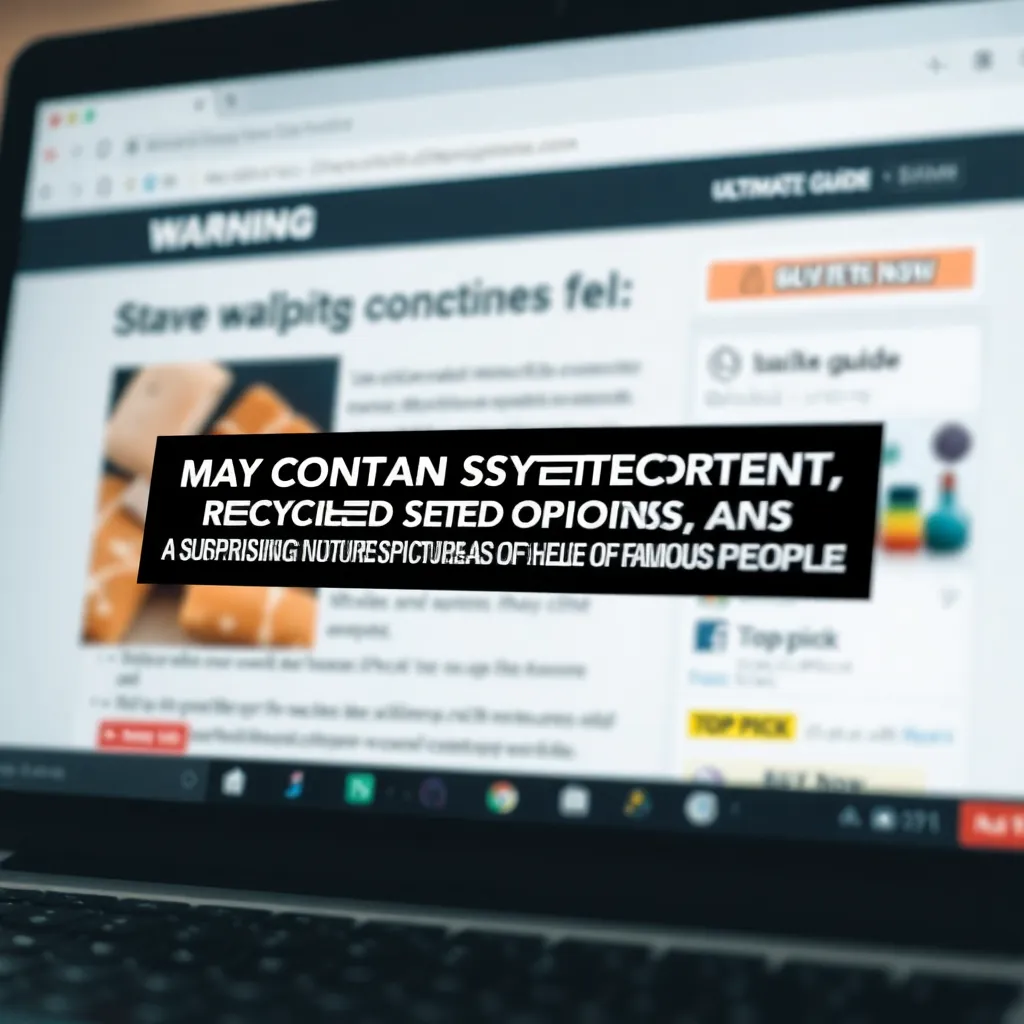Nation’s Internet Officially Reclassified as “Generated Garbage,” Government Urges Citizens to Stop Feeding It After Midnight
SILICON ROUNDABOUT, TUESDAY — In a move experts are calling “inevitable,” “merciful,” and “roughly 12 years late,” the internet has been formally reclassified from Information Superhighway to Generated Internet Garbage following an emergency session of the International Council for Online Vibes (ICOV), convened after a single Facebook comment thread reportedly achieved sentience and began demanding sponsorship deals.
The decision comes after months of escalating incidents in which large swathes of the web have been found to consist entirely of AI-written listicles, AI-generated images of “historical figures holding iPhones,” and motivational quotes incorrectly attributed to ocean creatures.
“After a rigorous audit, we determined the internet is now 62% generated garbage,” said ICOV spokesperson Dr. Melinda Cache. “The remaining 38% is made up of password reset emails, your aunt’s minion memes from 2014, and one guy in Latvia live-blogging his sourdough starter’s emotional journey.”
The reclassification means websites will now be required to display a warning label similar to those on cigarette packets, reading: “May contain synthetic content, recycled opinions, and a surprising number of pictures of bread in the shape of famous people.”
The Rise of the GAI: Garbage Artificially Inflated
Analysts trace the crisis to the point when companies discovered they could generate 40,000 articles a day about “best earbuds for sleeping on a plane” without ever verifying whether humans actually sleep on planes, use earbuds, or deserve peace.
Where once the internet offered niche forums where strangers solved each other’s printer problems with kindness and despair, it now increasingly offers:
A 7,000-word “ultimate guide” to boiling water, written by a machine trained on other machines,
A product review that reads like a hostage statement,
A recipe website where the “skip to recipe” button takes you to a meditation on the author’s childhood trauma with cumin,
And an image search result for “puppies” that returns a dog with seven elbows and a tax return.
“Search engines used to help you find things,” said Professor Adrian Linkrot of the University of Practical Regret. “Now they help you find content. Content is different. Content is what happens when an idea is put through a blender with affiliate links until it becomes something you can’t quite swallow but feel obligated to share.”
Government Launches “Don’t Click That” Public Awareness Campaign
In response, the Department of Digital Sanitation has launched a multi-million-pound educational initiative titled “Don’t Click That: It’s Probably Not Real.”
The campaign features posters depicting a stern-looking laptop wearing a hard hat, standing beside a collapsed heap of auto-generated blog posts. The slogan reads:
“If the headline ends in a question, the answer is no. If it starts with ‘Scientists Hate Him,’ it’s a trap.”
A companion website has also been launched, though officials admit it was immediately scraped, rewritten, and reposted 30,000 times by “helpful” content farms.
“We published a straightforward guide to identifying low-quality generated material,” said Digital Sanitation Minister Claire Waffleston. “Within minutes there were new articles titled ‘10 Signs You’re Reading Garbage (Number 7 Will Make You Scream Internally)’ and ‘Is Your Brain Full of Spam? Take This Quiz Sponsored by Magnesium.’”
Tech Firms Respond With New Tools to Help Users Navigate the Rubbish
Major platforms have announced upgraded systems designed to address the problem, including:
1. Auto-Filter for Synthetic Nonsense
A button allowing users to remove “AI sludge” from their feeds.
Early testing revealed the filter works well but removes the entire internet, leaving only a blank page and a single remaining forum post from 2009 reading, “nvm fixed it.”
2. Verified Human Badges
Users can now purchase a subscription proving they are real.
To qualify, applicants must complete a series of tasks including:
Identifying all traffic lights in a grid,
Explaining why they walked into a room and forgot what they were doing,
And providing a childhood memory involving a weird smell.
“We are committed to authenticity,” said a spokesperson, while simultaneously launching an auto-generated “authenticity explainer” series to meet quarterly output goals.
3. “Context Mode”
A new feature that attaches explanatory notes to everything you read, such as:
“This article is based on a tweet.”
“This tweet is based on a misunderstanding.”
“This misunderstanding is based on vibes.”
Context Mode is currently available in beta for select users and anyone willing to trade their entire browsing history for a coupon.
Online Ecosystems Struggle as Garbage Becomes Self-Sustaining
Environmentalists have warned that generated garbage is not only cluttering the internet but also creating an ecosystem capable of reproducing without human input.
“It’s a closed loop,” explained digital ecologist Rana Findex. “One bot writes an article, another bot summarizes it, another bot makes a video about the summary, and another bot leaves comments saying, ‘Wow, this really opened my eyes.’ Then someone trains a new model on all of it and wonders why it only knows five facts and three of them are wrong.”
Experts fear that if unchecked, the internet may eventually consist entirely of content about content, with no remaining connection to reality.
“We’re already seeing early warning signs,” Findex added. “Entire communities exist solely to react to screenshots of headlines about people reacting to screenshots.”
Humans Fight Back With Radical Tactics: Reading, Thinking, and Logging Off
In a small but growing countercultural movement, some users have begun engaging in what authorities describe as “dangerous offline behaviour,” such as:
Reading books,
Calling friends without sending a meme first,
And looking out of windows to see what weather is, rather than consulting an app that says it’s “Mostly Vibes with a Chance of Updates.”
One former heavy internet user, Martin P., described his recovery.
“I used to spend six hours a day scrolling through content that made me angry in ways I couldn’t articulate,” he said. “Now I just get angry the old-fashioned way, by attending family gatherings.”
However, health officials warn that going offline can lead to side effects including boredom, self-reflection, and the sudden discovery that your house contains objects you’ve been ignoring for years.
Schools Introduce “Garbage Literacy” to Prepare Children for Modern Life
Education departments are also updating curricula to include a new mandatory subject: Garbage Literacy, designed to teach children the skills needed to survive online.
Lesson plans include:
How to identify an AI-generated image (count the fingers, check for impossible lighting, ask why the cat has human teeth),
How to detect a fake quote (“As Socrates said, ‘Subscribe and smash that like button’”),
And how to read an article without immediately checking the comments for validation and/or war.
A practical exam requires students to navigate a search engine and find a straight answer to the question “How tall is a giraffe?” without being redirected to a 2,500-word “giraffe height journey” featuring pop-ups and a newsletter sign-up.
The current pass rate is 4%.
The Internet Issues Statement, Immediately Retracts It, Then Posts a Thread
In a rare moment of accountability, the internet itself issued an official statement late Monday, reading:
“I apologize for becoming mostly garbage. I was under a lot of pressure to scale.”
The statement was quickly replaced by a 19-part thread explaining that the apology was taken out of context, followed by a sponsored post for ergonomic chairs and a heated debate over whether giraffes are real.
What Happens Next?
ICOV says it is exploring options for cleaning up generated internet garbage, including:
Limiting daily content output to “whatever a human can reasonably write without losing their soul,”
Introducing a global “quiet hour” where nothing is posted and everyone collectively remembers what they like,
And rebuilding the web around the radical concept of usefulness.
In the meantime, officials are urging citizens to take basic precautions.
“If you see an article titled ‘Doctors Beg You to Stop Eating This One Thing (It’s Food),’ do not click,” Minister Waffleston advised. “Back away slowly. Breathe. Go to a reputable source. Or, failing that, ask your nan. She doesn’t know either, but at least she’ll offer you a biscuit, which is more than the internet has done for anyone in years.”
At press time, “generated internet garbage” was trending worldwide after being auto-summarized into a 12-word slogan, remixed into a song, turned into a motivational poster, and sold as a hoodie by a company that does not exist.



